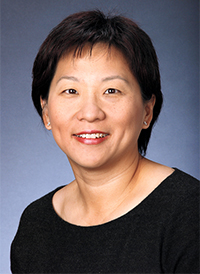Ophthalmologist Agnes Wong was a resident of Dr. Bill Macrae’s in the late 1990s. His vision for teaching surgery has inspired her to support an award in his name for graduate students who pursue a PhD in ophthalmic education.
Agnes Wong: “When you’re starting to learn cataract surgery, many doctors are hesitant to give you cases. Dr. Macrae had a very different approach. He just asked us to do it. He said, ‘Agnes, you can’t learn how to swim standing at the side of the pool watching other people swim.’ That really impressed me. Because of his confidence, the other residents and I got the exposure we needed to become better ophthalmic surgeons.
“Dr. Macrae is a great teacher because he strongly believes in the surgical education of residents. Through this award, I wanted to support his philosophy and encourage research in surgical education. The idea is to train PhD students in ophthalmic education so they can bring innovative techniques to our program and improve the curriculum. It will sow the seeds for the next generation of ophthalmologists to be better educators and researchers. Cataracts are a natural part of aging, so as our population gets older, there will be a greater need for ophthalmic surgery. And we shouldn’t think just about Canada. Cataracts are the number-one cause of avoidable blindness in the world. Twenty million people in the world are blind because of them.
“What better way to honour a teacher who had a huge impact on me and to support his vision for excellence in surgical education?”
As told to Scott Anderson. Agnes Wong is the John and Melinda Thompson Chair in Vision Neurosciences at the University of Toronto.
Recent Posts
People Worry That AI Will Replace Workers. But It Could Make Some More Productive
These scholars say artificial intelligence could help reduce income inequality
A Sentinel for Global Health
AI is promising a better – and faster – way to monitor the world for emerging medical threats
The Age of Deception
AI is generating a disinformation arms race. The window to stop it may be closing





